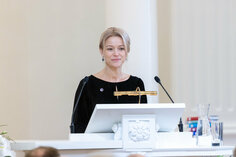Micro-Credential Programme "Fundamentals of the European Union"
The aim of the web-based micro-credential programme* is to support Ukraine as a European Union candidate country in its preparations for EU membership and to increase the awareness and competencies of Ukrainian public sector officials, civil society representatives and other groups involved in the accession process.
In cooperation with the Estonian Centre for International Development (ESTDEV), the University of Tartu can offer up to 18 tuition-waiver scholarships for Ukrainian citizens who work in the field related to Ukraine’s potential EU accession.
Study period: 30.09.2024 – 31.01.2025
Application dates: 01.09 – 22.09.2024
Language of instruction: English
Form of study: online learning (lectures via Zoom and independent work)
Credit points: 18 ECTS (468 academic hours)
Price: Free of charge for 18 qualified Ukrainian participants, selected on a competitive basis (see below for details). For others, a fee of 1530 euros applies.
The programme consists of three courses focusing on three areas that are key to understanding the functioning of the EU both internally and externally:
- The course on “Policy-making in the European Union” (6 ECTS) introduces the main EU institutions, their structure, functioning, and impact, as well as policy-making and decision-making processes, including potential future reform plans. Instructor: Professor Piret Ehin.
- The course on “EU enlargement and Challenges of the Wider Europe” (6 ECTS) provides an overview of the EU enlargement process and the challenges associated with integration from both a historical and contemporary perspective, drawing also on past experiences in the EU accession process. Instructor: Associate Professor Dr Stefano Braghiroli.
- The course on “Contemporary challenges of European integration” (6 ECTS) examines current developments, topical issues and various internal and external political processes related to the EU, including in the context of enlargement and Ukraine's potential future EU membership. Coordinator: Deputy Head for Academic Affairs, Ms Maili Vilson.
Upon completing the programme, the participant should be able to:
1) explain the composition, structure, powers and influence of the main EU institutions;
2) describe, analyse and assess the EU policy-making and legislative processes;
3) outline the EU’s policy portfolio and explain why the extent of EU involvement varies across policy domains;
4) describe and evaluate the accession criteria and the enlargement process as well as analyse the interests of various actors involved;
5) analyse the impact of the European Union on candidate countries, neighbourhood policy countries and Europe more broadly both from a historical and contemporary perspective;
6) assess Ukraine’s progress in the accession process and identify the next steps towards full membership;
7) discuss and form opinions on current developments and topical issues in European integration.
The programme is convened by the Johan Skytte Institute of Political Studies of the University of Tartu, Estonia and financially supported by the Estonian Centre for International Development (ESTDEV).
Programme instructors:

Piret Ehin is Professor of Comparative Politics and Deputy Head for Research at the Johan Skytte Institute of Political Studies at the University of Tartu (Estonia). She holds a PhD in Political Science from the University of Arizona (2002). Her main research interests include democracy, elections and voting behavior, legitimacy and political support, European integration and Europeanization. Her work has appeared in leading journals including the European Journal of Political Research, Journal of Common Market Studies, Cooperation and Conflict, Politics, Government Information Quarterly, Journal of Elections, Public Opinion and Parties, and the Journal of Baltic Studies. She has advised the Estonian government and European Parliament on EU-related issues, and has extensive experience in leading and implementing large-scale research and capacity-building projects (including Horizon 2020, Horizon Europe).
Stefano Braghiroli is an Associate Professor of European Studies at the Johan Skytte Institute of Political Studies, University of Tartu, Estonia. He also serves as the Director of the Master's programme in "European Studies" at the same institute. Dr. Braghiroli earned his PhD in Comparative and European Politics from the University of Siena, Italy, in 2010.
His research focuses on a variety of topics, including European party politics, regional integration, EU enlargement and neighbourhood policy, and party-based populism. Dr. Braghiroli's recent publications have appeared in such journals as New Perspectives, European Politics and Society, Contemporary Italian Politics, Southeast European and Black Sea Studies, Journal of Contemporary European Studies, Journal of Baltic Studies, Journal of Regional Security, and East European Politics, along with contributions to several book chapters.
Maili Vilson is Deputy Head for Academic Affairs at the Johan Skytte Institute of Political Studies of the University of Tartu. She is responsible for overseeing one BA and four MA programmes, both in Estonian and in English. She is teaching courses related to the European Union and her PhD dissertation project focuses on the Europeanisation of national foreign policy of EU member states. Her academic publications in international journals have focused on the Eastern Partnership and the Europeanisation of national foreign policy. She has served as an expert for several international think tanks as well the Ministry of Foreign Affairs of Estonia.
The programme will be delivered online (via Zoom platform) and in English with no simultaneous interpretation provided. The online meetings will take place twice per week (on Mondays and Thursdays at 16.00-17.30). Attending online meetings is strictly required. It is not possible to complete the programme if you miss more than three meetings per course. A recording of the respective meeting can be shared for study purposes with the participant who missed the meeting and can provide a valid justification for it.
Being accepted into the programme signifies a commitment for the entire semester. In addition to attending online meetings, you will be expected to follow lectures, participate in discussions, give short online presentations, read texts in English (textbook chapters, articles, media articles), write analytical papers, complete online tests and exams. The University of Tartu will provide access to Moodle study platform where course pages are located.
The participants are responsible for ensuring that they have access to required hardware, software, and a high-speed Internet connection. Courses will also require a headset (with microphone capabilities) and a camera. See also: system requirements for Zoom.
Conditions for enrolment for Ukrainian participants:
- Ukrainian citizenship;
- Currently working in Ukraine’s public sector, civil society or other institution involved or impacted by Ukraine’s prospective EU accession;
- Good command of English (able to follow lectures, participate in discussions and write papers in English).
Preference will be given to candidates currently residing in Ukraine and/or affiliated with Ukrainian institutions.
In order to apply, please register online here AND submit the following documents via e-mail to uta.kuhrt@ut.ee at the latest on 22 September 2024.
- Your CV (max 2 pages), including employment record;
- Motivation letter outlining the reasons for wishing to participate in the programme (max 1 page);
- A copy of personal details page of your passport;
- A document or a letter confirming knowledge of English at at least intermediate level (proof of coursework in English, a paper written in English, academic certificate showing English-language courses, language certificates, etc.)
Your personal data is processed according to data protection policy of the University of Tartu.
*A micro-credential programme is a short-term study programme designed to offer specialised knowledge in a particular field. Participants who complete all courses will receive a certificate from the University of Tartu.



